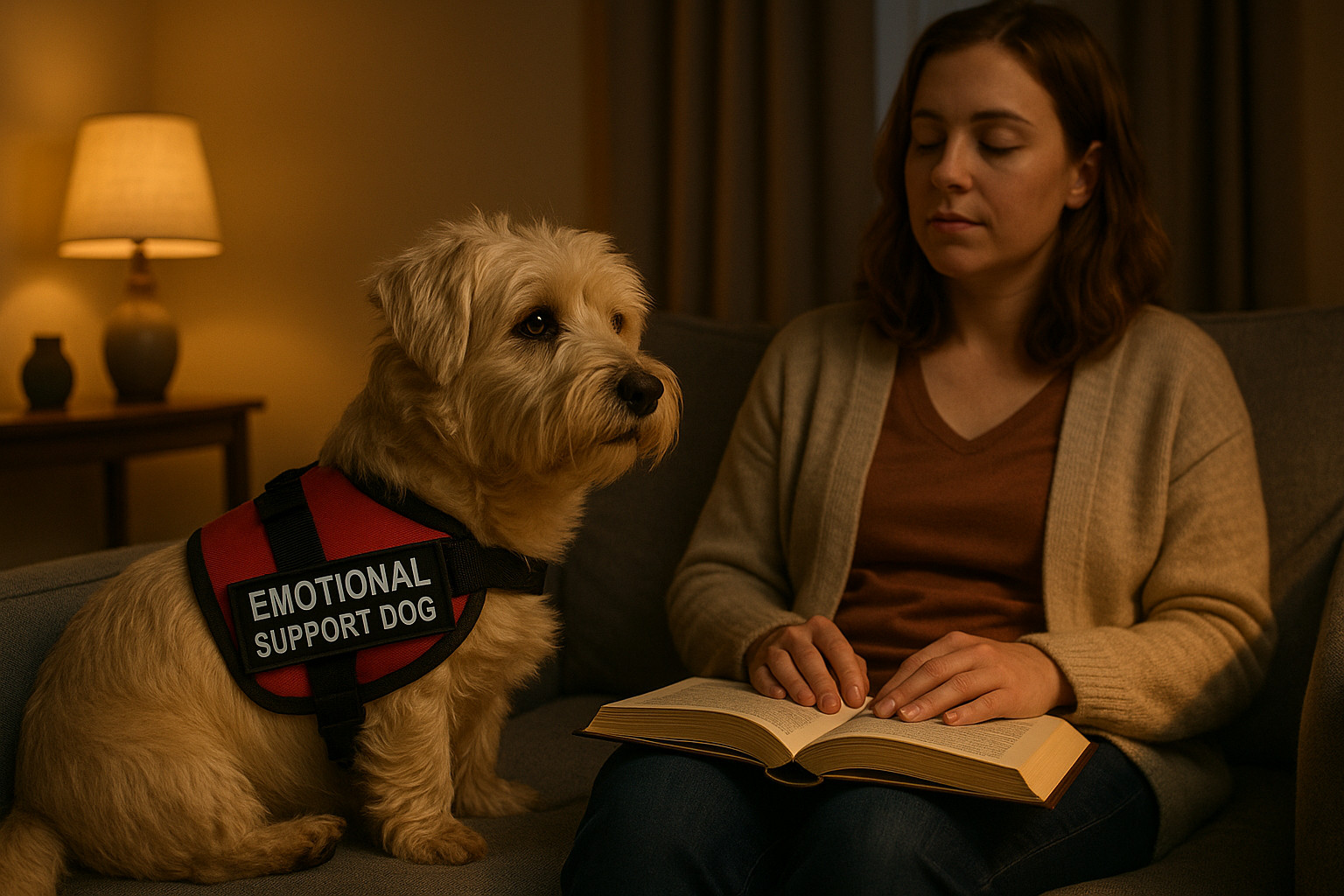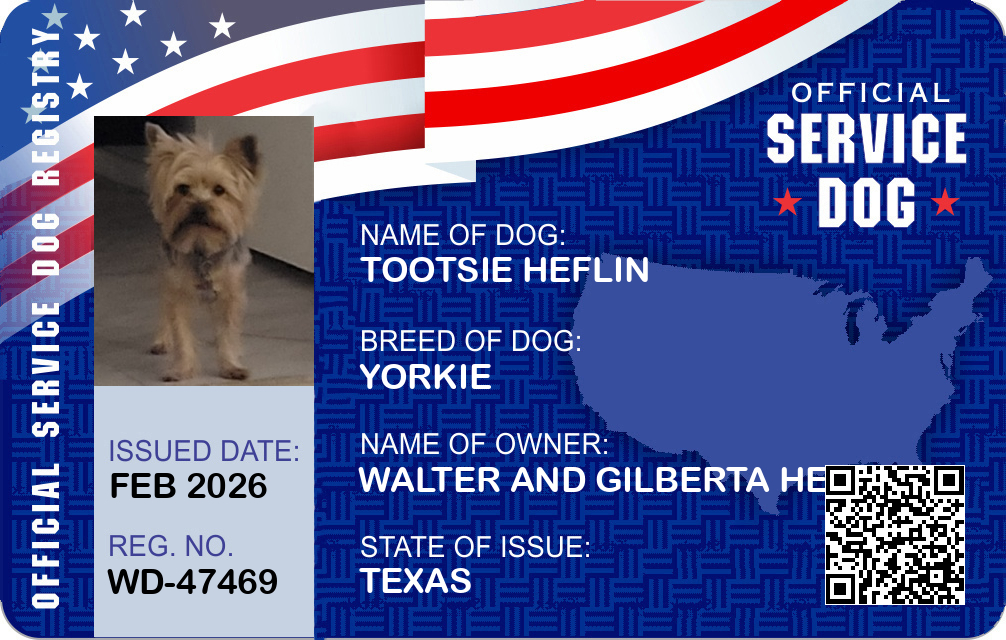Glen of Imaal Terrier as an Emotional Support Dog
Get Your Documents

Understanding the Emotional Support Role
As the need for emotional connectivity and support grows in modern society, the role of emotional support animals (ESAs) has become increasingly important. These companions help individuals cope with various psychological conditions by providing comfort, stability, and a non-judgmental presence. While the ESA is not trained to perform specific tasks like service dogs, their sole purpose is to benefit their handlers through companionship, helping improve overall emotional well-being.
Glen of Imaal Terrier Overview
Originating from the rugged landscape of Ireland, the Glen of Imaal Terrier is a unique breed known for its spirited yet affectionate disposition. Historically used for hunting and as a working dog, this breed has adapted to the changing demands of companionship. Their blend of loyalty, intelligence, and gentle nature makes them an intriguing option for individuals seeking an emotional support dog.
The Glen of Imaal Terrier’s compact size and sturdy build allow them to fit comfortably within diverse living situations. They generally weigh between 32-40 pounds and stand about 12.5-14 inches tall. Despite their modest stature, they possess a robust character, providing a reassuring presence for those in need of emotional stability.
Temperament and Emotional Connection
One of the breed’s most notable traits is its temperament. Glens are known for their steadfast loyalty and calm demeanor, traits that complement the role of an ESA exceptionally well. They are generally undemanding and content to spend quiet time with their handler, which can be incredibly comforting for individuals experiencing anxiety, depression, or loneliness.
Their keen sense of empathy allows them to tune into human emotions effectively. Glens often display intuitive behaviors, such as resting their head on a handler’s lap during times of distress, offering subtle yet significant reassurance. Their sensitivity to emotional cues makes them powerful allies in creating a more balanced psychological environment for their owners.
Adaptability and Daily Behavior
Glen of Imaal Terriers are notably adaptable, capable of thriving in various environments from bustling urban apartments to serene country homes. Their adaptability enhances their suitability as ESA, providing consistent support without the burden of constant adjustment.
- Energy Levels: They have moderate energy requirements. Daily walks and some playtime satisfy their need for exercise, allowing them to maintain a calm and manageable indoor demeanor.
- Independence: While they cherish companionship, Glen of Imaal Terriers also possess an independent streak, making them less prone to separation anxiety compared to breeds that require constant attention.
- Interactions: Their friendly, gentle behavior extends to children and other pets, making them excellent additions to family settings where they can provide support to multiple household members.
Situations Where Glen of Imaal Terrier Provides Strong Support
The Glen of Imaal Terrier’s demeanor and personality attributes allow them to provide robust emotional support across various situations:
- Combatting Anxiety: Their calm presence and reliable routine can help soothe individuals who are prone to anxiety attacks.
- Alleviating Loneliness: The breed’s sociable nature makes them ideal companions for individuals who live alone or in assisted living facilities, mitigating feelings of isolation.
- Routine and Structure: For those requiring a structured daily routine to manage mental health, Glen of Imaal Terriers offer regularity and predictability, especially beneficial for individuals dealing with conditions like depression.
Ideal Living Environments
These terriers adapt well to numerous living conditions, providing emotional support through consistent companionship. They integrate seamlessly into both:
- Urban Environments: Due to their manageable size and moderate exercise needs, Glens can thrive in apartments and busy city settings.
- Family Homes: Their gentle nature lends itself to environments with children or other pets, where they can offer support to all family members.
- Quiet Residential Areas: In quieter suburbia, their ability to enjoy open spaces and enrich family life further enhances the emotional bonds they form with their handlers.
Bonds with Different Types of People
The breed forms strong emotional bonds with diverse types of individuals, making them flexible emotional support animals:
- Senior Citizens: Their quiet, affectionate nature and manageable size make them suitable for older adults seeking companionship.
- Individuals with Anxiety or Depression: With their empathetic disposition, Glens offer stability and comfort when human interaction proves overwhelming.
- Families with Special Needs: Their patient, tolerant manners facilitate strong bonds with children or adults requiring additional emotional or developmental support.
Health, Care, and Wellbeing
While Glen of Imaal Terriers make exceptional emotional support animals, their physical health and well-being play a crucial role in their ability to provide consistent comfort. Understanding their care requirements ensures they remain healthy and capable of fulfilling their role.
Common Health Considerations
Glen of Imaal Terriers are generally robust, but like all breeds, they have specific health considerations:
- Hip Dysplasia: As a precaution, regular check-ups and maintaining a healthy weight are crucial.
- Progressive Retinal Atrophy (PRA): Routine veterinary eye examinations can help identify this eye condition early.
- Allergies: They may be susceptible to certain allergies, so monitoring skin health and dietary influences is advised.
Grooming, Comfort, and Maintenance Needs
The breed’s low-maintenance coat requires minimal grooming, which is advantageous for individuals unable to manage more demanding grooming routines:
- Brushing: Regular weekly brushing helps maintain coat health and controls shedding.
- Bathing: Bathing is required only when necessary, preserving natural oils.
- Nail and Dental Care: Regular nail trimming and dental upkeep are essential to avoid discomfort and health issues.
Preparing a Glen of Imaal Terrier for Emotional Support Work
Proper preparation and training are critical to maximizing the effectiveness of a Glen as an ESA, focusing on:
Socialization and Responsiveness
Socialization from a young age enhances their natural empathy and ability to read emotional cues:
- Exposure: Encouraging positive interactions with various people and environments helps foster adaptability.
- Responsive Training: Gentle training methods emphasize responsiveness and reinforce bond-building behaviors.
Managing Stress and Emotional Cues
Understanding and managing a Glen of Imaal Terrier’s stress ensures they remain a stable support presence:
- Routine: Consistent routines reinforce security and minimize anxiety.
- Observation: Attentive observation of their stress signals allows prompt management strategies.
Strengths, Challenges, and Ideal Homes for Glen of Imaal Terrier
- Strengths: Their loyal, empathetic demeanor, moderate exercise needs, and adaptability make them ideal companions.
- Challenges: Potential challenges may include managing their breed-related health concerns and ensuring adequate socialization.
- Ideal Homes: Environments with families, individuals living alone, and seniors benefit from their presence.
Final Thoughts
The Glen of Imaal Terrier’s unique blend of loyalty, intelligence, and empathetic disposition makes them an outstanding emotional support dog. Their ability to offer unwavering companionship and emotional stability enhances the quality of life for those they support. With the right care and environment, they thrive as valued members of any family or individual seeking comfort and connection.
Key Takeaways for the Glen of Imaal Terrier as an Emotional Support Dog
- Best suited for: Individuals or families in various environments, including urban apartments and family homes.
- Not ideal for: Environments where their health needs and moderate exercise requirements can’t be met.
- Emotional traits: Loyal, empathetic, and adept at forming strong emotional bonds.
- Care and health notes: Regular grooming and attention to health concerns, such as hip dysplasia and PRA.
- Environments where they provide the most comfort: Urban, suburban, and family settings with moderate exercise space.
Get Your Documents
Example State Cards













